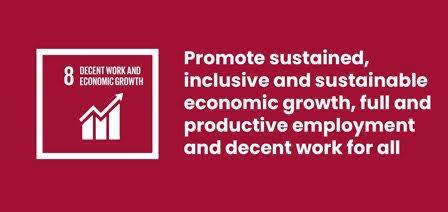The United Nations Sustainable Development Goal 8, also known as “Decent Work and Economic Growth,” aims to promote sustained, inclusive, and sustainable economic growth, full and productive employment, and decent work for all. This goal is crucial for reducing poverty and inequality, and for building strong, resilient communities and economies.
What does “Descent Work” mean here?
Decent work means equal opportunities for everyone to get work that is productive and delivers a fair income, security in the workplace and social protection for families, better prospects for personal development, and social integration. In many workplaces, women are paid less than men for the same nature and amount of work, so this kind of unfair treatment should be removed. It is also important that all women and men are given equal opportunities in the workplace. A continued lack of decent work opportunities, insufficient investments, and under-consumption lead to an erosion of the basic social contract underlying democratic societies: that all must share in progress.
Achieving this goal requires a multifaceted approach that addresses the various challenges and opportunities facing the global economy. Some of the key challenges include:
- Unemployment: Despite overall global economic growth, many countries still struggle with high levels of unemployment, particularly among youth and marginalized groups.
- Inequality: In many countries, the gap between the rich and the poor is widening, with a disproportionate amount of wealth and income concentrated in the hands of a few.
- Informal work: Many workers, particularly in developing countries, are employed in informal or unregulated work, which often lacks benefits and protections.
- Decent work deficit: Many workers are employed in low-quality jobs that do not offer fair wages, safe working conditions, or the opportunity for career advancement.
COVID-19 has had a significant impact on the global economy, and this has been felt especially hard in the labor market. According to the International Labour Organization (ILO), the pandemic has resulted in the loss of nearly 300 million jobs worldwide, with many people experiencing reduced hours, pay cuts, and layoffs. It has disrupted economic activities Globally resulting in the greatest recession since the Great Depression of the 1930s. In 2020 8.8% of global working hours which is equivalent to 255 million full-time jobs were lost. Informal employment, often the lowest paid and done by women and young people was particularly severely hit as they lacked adequate protections against lockdowns and illness. The impact has been particularly severe in developing countries, where informal and vulnerable workers have been hit the hardest by losing their jobs
To address these challenges and achieve SDG 8, a variety of strategies and policies are needed. These might include:
- Investment in education and training: To prepare workers for the changing demands of the global economy, it is important to invest in education and training programs that provide the skills and knowledge needed to succeed in the modern workforce.
- Support for small and medium-sized enterprises (SMEs): SMEs are a major source of employment and economic growth, particularly in developing countries. Supporting their growth and development can help create new jobs and stimulate economic activity.
- Promoting fair wages and working conditions: Ensuring that workers are paid fairly and treated with respect is crucial for building strong, resilient communities. Governments and businesses can support this goal by setting and enforcing minimum wage standards and promoting good working conditions.
- Encouraging entrepreneurship and innovation: Encouraging entrepreneurship and innovation can help drive economic growth and create new job opportunities. Governments and businesses can support this goal by providing resources and support for entrepreneurs and innovators.
In addition to these strategies, it is important to involve all stakeholders, including workers, employers, governments, and civil society organizations, in the process of achieving SDG 8. This will help ensure that the needs and interests of all groups are taken into account and that the goal is achieved in a way that is fair and inclusive.
But what can I do to help achieve SDG 8? Here are a few ideas:
- Support fair and ethical businesses: By choosing to do business with companies that prioritize environmental sustainability, social responsibility, and fair labor practices, you can help create demand for decent work and support the growth of responsible businesses.
- Volunteer or donate to organizations that provide job training and support to disadvantaged or marginalized groups: By supporting organizations that help people gain the skills and knowledge needed to succeed in the workforce, you can help break the cycle of poverty and inequality.
- Advocate for policies that promote fair and decent work: Whether through writing letters to your elected representatives, participating in protests and demonstrations, or simply spreading the word about important issues, you can help raise awareness and advocate for policies that promote fair wages, safe working conditions, and the right to organize.
- Educate yourself and others about the importance of decent work: By learning about the challenges facing the global economy and the ways in which decent work can help reduce poverty and inequality, you can help raise awareness and encourage others to take action.
In conclusion, SDG 8 is a crucial goal for building strong, resilient economies and communities. By addressing the challenges and opportunities facing the global economy, and by involving all stakeholders in the process.






